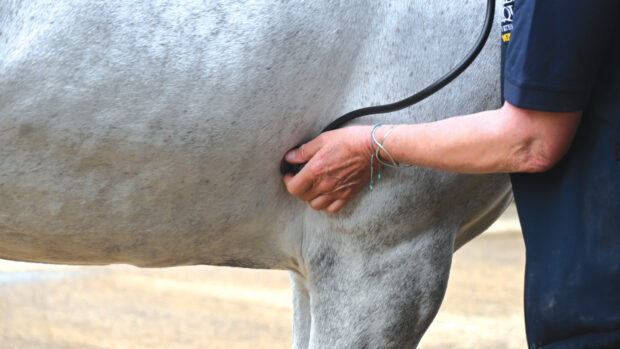A new study shines a light on “concerning” ethical challenges being faced by vets treating competition horses.
Researchers from the University of Bristol aimed to understand some of the ethical issues UK equine sports medicine vets are facing. A survey was taken by 97 vets, with questions on topics including conflicts of interest, pressure from owners, duties and obligations for vets set out by sport governing bodies and treatments and procedures used in sport medicine.
The most common challenge raised by the respondents was conflict of interest – notably “balancing the horse’s health and welfare with client wishes, particularly for the horse to compete”. An example given was owners requesting ongoing treatment and management of injuries to allow the horse to continue competing at a high level, where “it might be more appropriate to drop to a lower level/retire the horse”, and pressure put on vets to provide a “quick fix” for a horse for it to compete or be sold.
Other challenges highlighted were owner/trainer disregard of lameness, being asked to administer drugs and not put them on the clinical record as they appear on prohibited substance lists, and owners medicating horses without veterinary advice.
The limitations of the study were noted: vets who had concerns about ethical issues in sports medicine may have been more motivated to respond, and there was potential for response bias – but the researchers said this study provides “a foundation” for future work in this area.
The researchers said some of the findings “will be concerning for governing bodies” – and that the responses revealed areas that “could pose reputational risk to equestrian sport and/or the veterinary profession”.
Lead author Kate Allen told H&H vets face ethical challenges in all areas of practice, not just in sports medicine, but the team wanted to explore “the unique aspects” of being a sports medicine vet.
“It’s that added component of having the pressure for the horse to continue to train and compete, while thinking about horse welfare, rider safety, upholding clean sport – and trying to plan for the short- and long-term health of the horse,” said Dr Allen.
“The biggest challenge to come out is the competing interests of owners and trainers, and the pressure put on vets. There are times when the competing interests, whether that’s the client, or the sport’s regulations, or financial limitations, make it more challenging for you as a vet to meet that primary responsibility to the welfare of the horse.
“It’s also important to acknowledge that sports medicine has developed over recent decades, and there have been some great advances – but as care advances and we can do more and more, we need to think, ‘We can do this, but should we?’”
Dr Allen added that it would be positive for the profession and governing bodies to work closely together on these ethical challenges, and for clearer guidance from governing bodies to be developed on what procedures and treatments are both optimal and permitted, so that vets could use these to help guide discussions with clients.
British Equine Veterinary Association chief executive David Mountford told H&H the paper provides “thought-provoking evidence to substantiate the ethical challenges vets sometimes face in practice”.
“The authors have highlighted the potential limitations of the study, but it is very clear that there are a range of situations experienced by vets which could pose a reputational risk to equestrianism and/or the veterinary profession,” he said.
“Animal welfare is, and should always be, at the forefront of the industry’s collective minds, and this research highlights a need to develop systems that reduce the risk of ethical dilemmas occurring when treating horses.”
- To stay up to date with all the breaking news throughout the Paralympic Games, Burghley, Horse of the Year Show and more, subscribe to the Horse & Hound website
You might also be interested in:

Scientists find horses are cleverer than some previously thought

Pioneering study sheds light on early pregnancy loss in horses – which is similar to humans

Subscribe to Horse & Hound magazine today – and enjoy unlimited website access all year round




